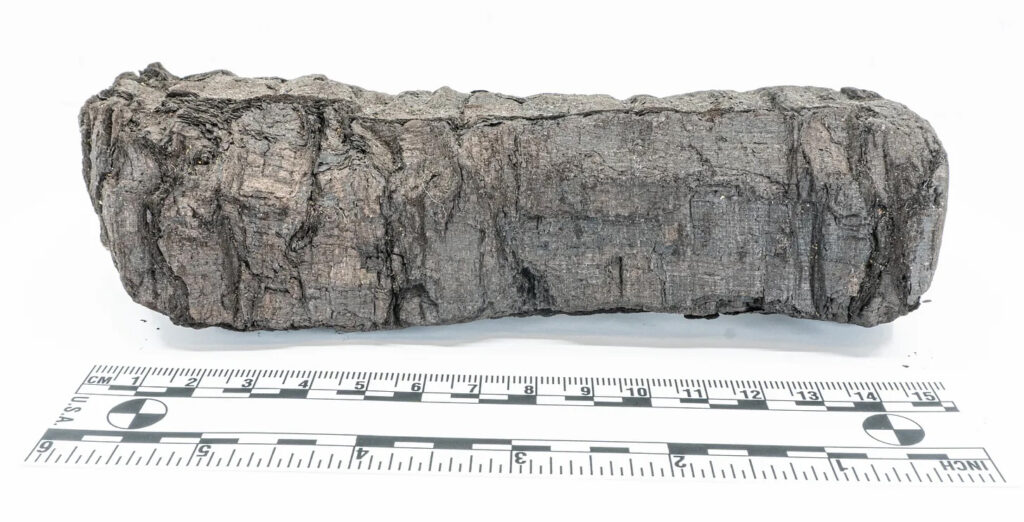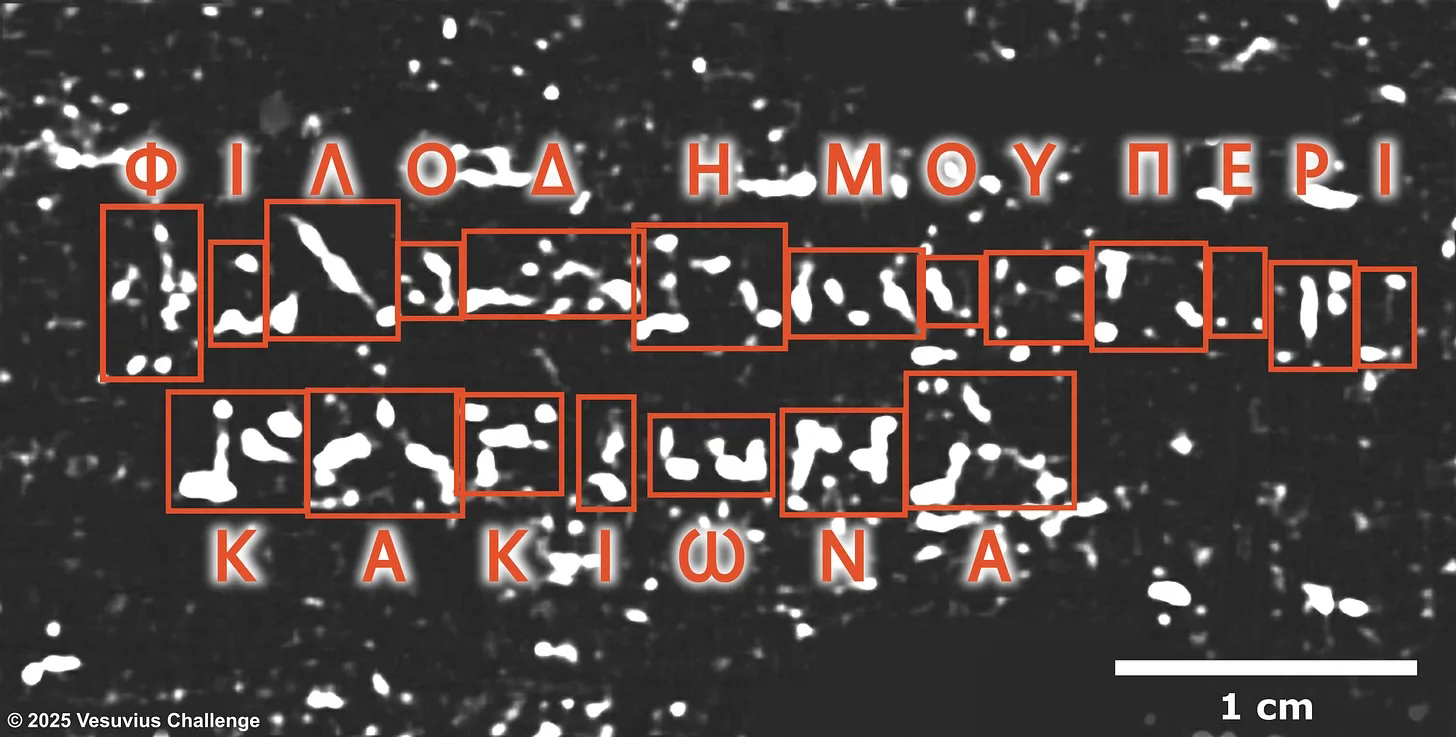Volcanoes are erupting in The Philippines, but on-fire Australia received some welcome rain. The Iran war cries have been called off and The Donald’s military powers are about to be hamstrung by the Senate. Meanwhile, his impeachment trial is starting, and we’re all on Twitter for a front-row seat.
What Could Go Right? Buried by a Volcano, Read by AI
The only library to survive Mt. Vesuvius is finally being decoded, with the help of a particle accelerator or two.
This is our weekly newsletter, What Could Go Right? Sign up here to receive it in your inbox every Thursday at 5am ET. You can read past issues here.
Buried by a Volcano, Read by AI
About 2,000 years ago, the Epicurean philosopher Philodemus sat down to record his thoughts on a group of vices that are no less pertinent today: flattery, arrogance, greed, and slander. These musings eventually became a multi-volume set of at least ten books together referred to as On Vices.
Much of Philodemus’ work was “vacuum-sealed” in the library of a villa in Herculaneum, an Italian city about 10 miles from Pompeii, when Mt. Vesuvius erupted. The blast carbonized the library’s papyrus scrolls and then covered them with ash and mud, preserving the text inside.
Discovered in 1750, the library is the only one to survive from that time, and is believed to be a trove of ancient Greek and Roman works. While 800 of the library’s scrolls have been excavated, their condition meant that they couldn’t be unrolled without being ruined. What was inside them has remained largely a mystery since at least 79 A.D.

That is, until last year, when the participants of an online competition called the Vesuvius Challenge successfully decoded dozens of columns of text from a Herculaneum scroll, using AI-based technology that can “read” ink patterns from the inside of a rolled-up papyrus. (You can read about how the technology works in more detail here. Since then, one of the competition winners gained some notoriety for his work at the Department of Government Efficiency.)
The first step of the decoding process is to scan the scrolls in high definition—so high that it must be done with a particle accelerator.
Of the 800 scrolls that have been excavated from the villa, five have already been scanned, 18 are currently being scanned at a particle accelerator in England, and 50 more will soon be flown to France. The scrolls are so fragile that they must travel in bespoke 3D-printed cases that were created by researchers in Naples, where the scrolls are held. The goal is to scan all 800 by the end of 2026.
After the scanning comes the decoding, which is slow going. No scroll has yet to be fully decoded, because much of the process must be done by hand; the team behind the Vesuvius Challenge is working on automating and optimizing it.

Still, the already scanned scrolls continue to yield fruit. On Monday, one of their titles was recovered: Philodemus’ On Vices, Book 1.
What Could Go Right? S7 E10: The Supreme Court vs. Donald Trump with Stephen Vladeck

It’s time for a lesson on the U.S. Supreme Court. Zachary and Emma speak with Stephen Vladeck, CNN’s Supreme Court analyst, law professor at the University of Texas, and author of the newsletter One First. The Supreme Court is at a crucial historical moment as it clashes with the Trump Administration. Stephen, Zachary, and Emma dive into the controversy around Trump’s emergency powers, the judicial pushback against presidential overreach, and the pivotal role of balance among the branches of federal government. Stephen highlights tariffs, immigration, and the nerdy nature of legal battles. | Listen now
By the Numbers
25.4%: Latin America’s multidimensional poverty rate in 2023, down from 45.8 percent in 2008. A multidimensional poverty rate incorporates factors other than income, such as housing and health.
4%: The year-on-year drop, between March 2023 and 2024, in Japan’s greenhouse gas emissions. Japan’s emissions are now the lowest recorded since data collection began in 1990.
75%: The 2024 preschool enrollment rate in Uzbekistan, up from 27 percent in 2017
Quick Hits
🗿 Technology that operates like sonar but uses pulses of light instead of sound has revolutionized the field of archaeology, leading to several discoveries in the dense jungles of Mexico and Guatemala that have transformed our understanding of Mayan civilization.
🇻🇳 Last week marked 50 years since the fall of Saigon. Since then, Vietnam has transformed. Poverty has plummeted, income per capita has multiplied sixfold, and optimism abounds—although not all is rosy. The New York Times asks what comes next in a beautiful photo essay. ($)
🫀 A pacemaker its developers claim to be the world’s smallest is smaller even than a grain of rice. It can fit inside the tip of a syringe in order to be injected into the body, and is a good match for babies born with congenital heart defects.
🐷 The US Food and Drug Administration has approved, for consumption, pigs that have been gene-edited to be immune toward a respiratory virus, as well as a new treatment for the blood clotting disorder hemophilia that doesn’t need to be taken as frequently as existing options. The agency has also announced a plan to phase out animal testing requirements for certain drugs where human data and AI-based computational modeling will suffice. This will speed up the drug development process and cut down on the unnecessary use of animals.
🍃 Maryland has reached its conservation goal to protect 30 percent of its land—nearly 1.9 million acres—by 2030 six years early, and is now looking to protect 40 percent by 2040. Nine other states are also attempting to achieve “30 by 30,” a target set by the United Nations, but Maryland got there first.
🐠 Meet the seven winners of an environmental prize that goes to grassroots activists fighting corruption and corporate power, like an 81-year old former electrical engineer in Mongolia who protected hundreds of thousands of acres of the Gobi Desert from being mined.
🍺 Since prehistory, as humans have risen, so too has the consumption of booze—until now. Wine consumption peaked in the 70s, and beer in the aughts, leading at least one Bloomberg columnist to argue that the future is sober. ($)
💡 Editor’s pick: Were the recently announced “de-extincted” dire wolves an abomination or a scientific accomplishment?
TPN Member Originals
(Who are our Members? Get to know them.)
- Think the trade war with China hurts now? Just wait. | WaPo ($) | Fareed Zakaria
- Why I debated Curtis Yarvin at Harvard | WSJ ($) | Danielle Allen
- Forget DOGE. We need Elon Musk to solve our robot problem. | WaPo ($) | James Pethokoukis
- College is more affordable than many parents think | NY Times($) | Ezekiel J. Emanuel
- Has clothing declined in quality? | Marginal Revolution | Alex Tabarrok
- Sam Altman indicted by ChatGPT | NonZero | Robert Wright


